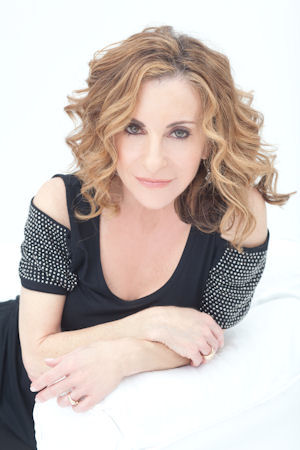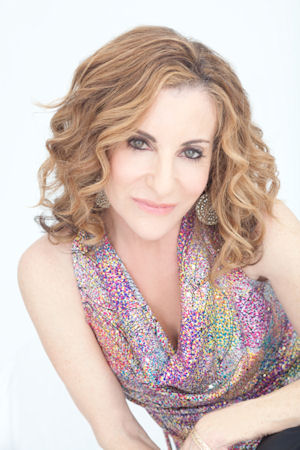 Don't
Wait Too Long Coos Judy Wexler
Don't
Wait Too Long Coos Judy Wexler
 Don't
Wait Too Long Coos Judy Wexler
Don't
Wait Too Long Coos Judy Wexler
 It
has been said before that a good lover begins to make love to his or her partner
long before they reach the bedroom and long before things become sexual. If that
is true, then one also might conjecture that creating a romantic album, begins
long before you reach the recording studio. That certainly appears to be the
case with Judy Wexler and her current album,
Under A Painted Sky and one might say
that she had lots of help along the way, from her husband Alan Wexler who, as
Ms. Wexler and I shared many laughs throughout our recent conversation, agreed
that Alan is indeed a romantic, who Ms. Wexler confesses has recited to her on
several occasions throughout their thirty-three years together, the Andrew
Marvell poem, To His Coy Mistress.
It
has been said before that a good lover begins to make love to his or her partner
long before they reach the bedroom and long before things become sexual. If that
is true, then one also might conjecture that creating a romantic album, begins
long before you reach the recording studio. That certainly appears to be the
case with Judy Wexler and her current album,
Under A Painted Sky and one might say
that she had lots of help along the way, from her husband Alan Wexler who, as
Ms. Wexler and I shared many laughs throughout our recent conversation, agreed
that Alan is indeed a romantic, who Ms. Wexler confesses has recited to her on
several occasions throughout their thirty-three years together, the Andrew
Marvell poem, To His Coy Mistress.
The
poem was introduced to the conversation when talking about the song “Don’t Wait
Too Long,” the story of an older woman who is attracted to a younger man. The
song features an elegant guitar solo by Larry Koonse and equally charming piano
accompaniment by Alan Pasqua. “Don’t Wait Too Long,” was written by Sunny Skylar
and was previously recorded by Frank Sinatra, Blossom Dearie and Tony Bennett.
Judy Wexler believes that Andrew Marvell’s poem and Sunny Skylar’s song express
the same sentiment.
“To me “Don’t Wait Too Long,” is a May – December
relationship, about an older woman with a younger man.
They are having a relationship, a love
affair and there is trepidation on his part. She is just saying, hey time goes
by and you can’t wait, because you just don’t know what is going to happen in
life. The poem (To His Coy Mistress)
says you can’t waste time. Alan has recited it to me over the years and then
that lyric (“Don’t Wait Too Long”) comes up and you say wait, that is the
sentiment. I think that she is just convincing him, don’t wait,” says Ms.
Wexler.
When asked if the romantic collection of songs that
comprise Under A Painted Sky reflect
a romantic side of Judy Wexler’s own personality she says, “I don’t know if it
does or not (she laughs), but when I was thinking about what I wanted and the
whole effect of the album, I was thinking of something moody, relaxing and
something that gives peace to the listener. I wanted each song to resonate with
me. I have a very long and happy
marriage and I met my husband when I was very young and now I am not very young
(she laughs) and we have been together for thirty-three years. We got together
when we were very young. (she jokes they got together when they were five years
old.) I was talking to someone the other day and the word wistful kept coming up
and I was thinking of the Abbey Lincoln tune “And How I Hoped For Your Love. “
I thought about how it is so wistful. It is about love lost and the hope
that went into it and then it was lost. I am a huge Abbey Lincoln fan and I
think it is an unusual song. I don’t know of any other tune (in which) the
lyrics start with the word “and.” I
thought that was a really interesting way to start a song, because it is kind of
starting in mid-sentence or mid-thought. I am drawn to the wistfulness,” she
says.
“I was thinking, what would be good if someone was
sitting in a hot tub and just wanted to relax and listen to a collection of
songs and what would the overall feeling be. That is kind of the approach that I
took to Under A Painted Sky,” she
says.
As much as many of the songs from Judy Wexler’s current
album are romantic, one of them, “An Occasional Man,” first recorded by Jeri
Southern in 1955 is steamy and might conjure up images of handsome men with
tanned, muscle bound bodies feeding women grapes.
Judy Wexler who spoke to Jeri Southern’s daughter about
the song, says, “I love that song, because it is sensual and sexy. Jeri
Southern’s daughter said that in ’55 when the song came out it was considered to
be too risqué for the time and that Hawaii was the only place that fully
embraced that tune and a woman singing that tune, because they weren’t uptight
like the rest of the country. I guess the image of a woman ripping off her
clothes and jumping into the ocean was just too much. I love it for its
sensuality and its humor. It is kind of a funny graphic image and I actually
first heard (the song) in a commercial. I don’t remember what the product was,
but I believe it was Dinah Washington (singing). I thought what a cool song.
When I dug deeper, I found out that all of these cool people had recorded it,
including Abbey Lincoln, Anita O’Day and of course it was Jeri Southern’s song
originally. It is a fun song to perform live and I think (the audience)
appreciates it and that they “get it.” I always dedicate it to the women in the
audience and for that (time) when they want a man around every now and then, not
all of the time (she laughs).”
Judy
Wexler did not pursue a career in music, until she was in what she refers to as
mid-life. Although, music has always been a part of her life she began her
career in front of audiences, as an actress, appearing on stage and on
television, including guest starring on the popular sitcom
Frazier.
“I started being interested in
acting probably when I was about sixteen years old. In high school, I was very
involved in performing in plays and musicals. Then I went to the University of
California, Santa Cruz with the intention of becoming a clinical psychologist.
I was a psych major and then after a couple of
years I added theater to my major and I got my BA in both of those. While I was
studying psychology I was acting in plays at college. I was also studying
Classical piano very intensely.
When
I graduated, I formed a theater collective with three other college mates and we
moved to San Francisco. Immediately after college, I started acting. We created,
we directed, we had really supportive audiences in San Francisco and we toured
around California. After that I just did plays and musicals in San Francisco,
moved to LA and did a little bit of TV work and did more plays and musicals. I
did the Groundlings which is a big improv school and theater here in LA. I did
that so I could be quicker on my feet.
I did the whole school at the Groundlings
(past students include, Phil Hartman, Lisa Kudrow, Jon Lovitz), which was
grueling and I had a friend that did one of the classes with me and (that
person) said I am going to go to music school and take some piano lessons. I had
been playing piano all of my life, so I thought I would take some Jazz piano.
The school had a big Jazz component. I took Jazz piano there and I studied Jazz
harmony. Alan my husband was always a big Jazz fan and he introduced me to so
much great music. I just decided to quit acting one day and I said I have had
enough. I started devoting myself to learning Jazz. That is what happened. That
was in mid-life.
I just made a decision to quit.”
If you live on the west coast, on February 4th,
Judy Wexler is performing at Café 322 in Sierra Madre, California, on the 18th
at Yoshi’s in San Francisco, with a return engagement on March 13th.
In San Diego you can catch Ms. Wexler performing at Saville Theatre, City
College of San Diego. For those on the east coast, you will have to wait until
spring. Judy Wexler is performing at the Virginia Arts Festival, Attucks Jazz
Series, Norfolk, Virginia on April 28th, Scullers in Boston May 9th
and New York City’s Birdland on the 10th of May.
One can expect to hear Judy Wexler sing songs such as
“Avec en Temps,” “Whisper Not,” “An Occasional Man,” “Last Time For Love,” “The
Great City,” and “Wonderful, Wonderful,” from the album
Under A Painted Sky. In addition, she
says she is trying to integrate her favorite songs from all three of her albums,
as well as a Richie Havens tune, “Follow,” that she has not yet recorded, but
that she intends to record someday.
Judy Wexler is a dynamo when she is in front of an
audience and her phrasing is evocative. She says, “If you can communicate
convincingly, authentically and honestly, I think that is where it is at.”
Interview by Joe Montague, all rights reserved, protected by copyright © 2012 Return to Our Front Page
This interview is protected by copyright © and may not be reproduced in print or on the internet or through any other means without the written permission of Riveting Riffs Magazine, All Rights Reserved